by mariteaux
Rarely do albums come out right on the first shot. Labels reject them, bands disown them, and they get added onto after release. Here on First Draft, we take a look at albums that got cut down or remade and see what difference the changes made.
This especially long-winded First Draft concerns the infinite permutations of Yankee Hotel Foxtrot, Wilco’s 2002 art rock opus which streamed online officially for the first time 22 years ago today.
An apology to start with: I had hinted at the end of the Dandy Warhols Come Down First Draft that the second one would be for Failure’s Magnified and its demos, and I’d intended to get that up in August. I didn’t–personal reasons and just being busy kept me from finishing it, despite it being 90% done and sitting as a draft on Letters. I’ll have that one going up in two weeks at the start of October instead. If I happen to make reference to multiple First Draft entries somewhere in the following 6,000 words, there are more written, I just haven’t gotten them up yet.
“Why not just post that one this month?” you ask? Because today marks 22 years of a very special landmark album with a very messy history, and I couldn’t pass on the date.
This is gonna be an intense one. Most of my First Draft entries only concern a single album and then another disc of alternate mixes or demos of roughly equivalent length. Similarly, most albums are recorded once, maybe twice, and there’s not a lot of extra material to speak of. This one concerns a single album–and then six more discs of outtakes and early versions of its songs. And similarly, this album was recorded repeatedly over a year-and-a-half by a band genuinely trying to figure out how far they needed to go to make its weirdness work.
I myself have found a real rival in myself
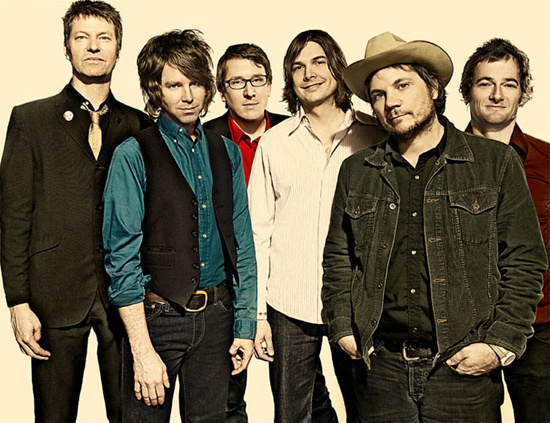
Wilco’s story feels like something from a novel. A boy raised on punk rock and country named Jeff Tweedy forms a rising star roots rock outfit called Uncle Tupelo, it breaks up, and he drags the backing band along to make a new band called Wilco. They turn heads with a double album, then an experimental pop rock album with lyrics about murdering your wife, and finally deliver their opus, Yankee Hotel Foxtrot. Hell, it was actually turned into a movie!
Don’t put much stock in the “country” or “alt-country” labels you hear tossed at Wilco. It’s not that the influence isn’t there, because it is, it’s just that it’s more in the mindset than in the sound of drugstore cowboys over 808s that somehow passes for country these days. Wilco is singularly American; if Radiohead sang about the dulling noise of tram lines soundtracking the loss of individuality in Oxford, Wilco sings about ATMs and skyscrapers as the backdrop for challenged love in Chicago. Wilco is more acoustic guitars and strange instruments, mellotrons and tack pianos and string quartets, the sound of organic instrumentation blended with buzzes and alienated computer voices.
Since Yankee Hotel Foxtrot, Wilco has become more and more stable in their lineup, their sonic identity, Jeff Tweedy’s well-documented addictions, and the band has gone from taking the world by storm to having a large, comfortable fanbase of similarly old people. After having a well-documented struggle in getting Foxtrot released (hilariously, a label exec is quoted in the booklet for the boxset as saying “every time you give it back to us, it sounds worse”), they’ve gone pretty indie as well, recording full albums in their own space at The Loft and surprise dropping albums for free on their website. It must be a pretty damn good time to be in Wilco.
So time’s just time, cars can’t escape
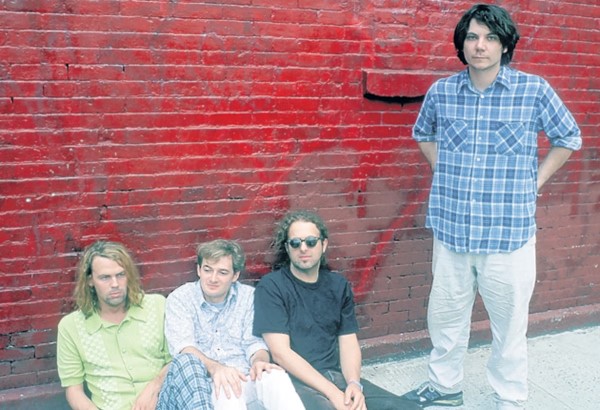
Let’s discuss the struggle in getting here, though. I want to take you back to 2000, when the new millennium meant something and Wilco were working on a followup to Summerteeth. Just like the band itself, Yankee Hotel Foxtrot is an album utterly consumed by its stories. The ambitious frontman, struggling with his longtime drummer (Ken Coomer, soon to be replaced by Glenn Kotche) and songwriting buddy (Jay Bennett, soon to leave the band). The drug use. Warner handing the album to the band after a PR nightmare, and Wilco selling it back to them through another sublabel. 9/11 coloring the lyrics, the themes of reconciling optimism for the future and the pessimism for modern America, and the cover art of, what else, two gigantic towers.
I have a tendency to get very put off by big, elaborate stories, whether that’s an album’s fable or just playing through Okami, and everyone’s talked that stuff to death anyway, fetching as though it is, so let’s just put it like this. Yankee Hotel Foxtrot went through several, several revisions, none of which are clearly delineated, all of which happened because a new person was introduced and brought their own methodical madness to the process. I have at least three of those revisions, with three more discs of cast-offs. Let me introduce the Super Deluxe boxset.
This is about as definitive a document about the making of Yankee Hotel Foxtrot as you’re going to get. It’s an eight-CD set featuring a coffee table book, one-half written history and one-half oral history between Jeff Tweedy, Wilco’s second drummer Glenn Kotche, Foxtrot producer/mixer Jim O’Rourke and boxset producer Cheryl Pawelski about wrapping up recording the album, mixing it, and the immediate aftermath of release. This is exceptionally well-done, and there’s several points in the oral history where Cheryl asks specifics about session notes, dates, who was involved with what. The people behind this set absolutely love Wilco, and it shows.
Those eight CDs consist of the original album, three separate full-length drafts of it (American Aquarium, Here Comes Everybody, and The Unified Theory of Everything), an extra disc of random outtakes (Lonely in the Deep End), a radio performance with WXRT in Chicago dated September 18th, 2001, and a two-disc live set post-dating the album’s release in 2002. This is intense. As far as I’m concerned, I should’ve paid more than $80.
Here comes the confusing part, though. How do you define the three draft discs? How do you arrange a messy, year-and-a-half long recording session into three distinct running orders, how accurate is that, and can I then judge the discs as individual albums? Can you listen to American Aquarium as the very first version of the album? Is Here Comes Everybody version 2.0, or is it just a different sonic world that runs parallel to American Aquarium in chronology?
I usually try to work off artist intent with these First Drafts (as in, what the artist themselves declares as a separate version of their work, like aborted albums later released as their own works or demos for an album recorded and then collected as a whole), and you can make a case either way here. Wilco signed off on this, so the three alternate drafts are three canon early versions of Foxtrot. The three drafts are label inventions, collected by people who weren’t in the band, and so they’re no more canon than the bootlegs.
I guess the distinction is educational, though. They’re sequenced like their own works, not like Yankee Hotel Foxtrot, they all contain their own songs, they do get progressively more elliptical, and as said, the people behind the boxset really seem to have done their homework. We’ll call them their own drafts. (There’s less of a case to be made for the bootlegs since they’re unofficial, obviously, but we’ll address where they fit into all this later.)
So to recap, we have:
- Yankee Hotel Foxtrot itself
- American Aquarium, the first disc on the Super Deluxe boxset
- Here Comes Everybody, version 2.0 on the Super Deluxe boxset
- The Unified Theory of Everything, a third version, same boxset
- Lonely in the Deep End, extra outtakes, same boxset
- YHF Demos, bootleg #1
- Yankee Hotel Foxtrot Engineer Demos, bootleg #2
This is gonna take some time to unravel. Stick with me.
The Final Product: Revisiting Yankee Hotel Foxtrot
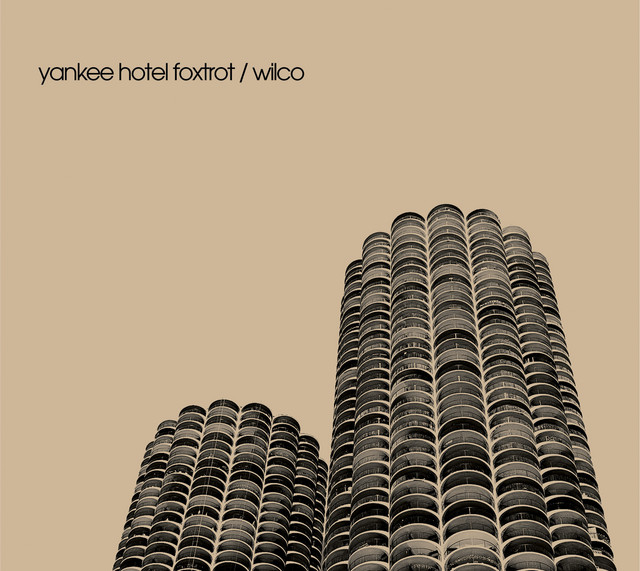
There’s a lot of words you can use to describe Yankee Hotel Foxtrot, but the one I think fits best is “scattered”. Each song is a little wolf in sheep’s clothing, chunks of great pop tunes scattered about airy, lonely ambience, noise excursions, lyrical fragments, and attempts to communicate something, only half of which we’ll ever know. These aren’t accidental atmosphere or failures to get themes across, they are the themes. Jeff Tweedy sings about being lost on the sidewalk, and all the instruments sound just as lost. You’ll find all the pieces, it just takes a bit.
Sometimes, the ambience can be patience-testing. I’m at odds with the first minute of “I Am Trying to Break Your Heart”, consisting of drum noises and electrical buzzing as a way to set the mood of the album. I’ve called this sort of thing a “Wilco intro” when talking about other albums. If you’re listening to the full thing, a minute of ambience is nothing. If you just want to get to the song, you’ll be doing a bit of skipping. That’s just me being impatient, though. Once you get past the masterwork stylings on the ends, you find a fantastic alternative pop album in the middle, and the strong songwriting and quality sounds are what counts.
Not a single song on Foxtrot is forgettable. “I Am Trying to Break Your Heart” slowly reveals a very distracted, broken pop song through repetition of its various fragments, the perfect musical backdrop for Jeff Tweedy to plead that we just forget all the drunken angst and go back to when we were first good together. “Radio Cure” does the same slow buildup, droning a little more and fragmenting a little less, to get to one of the finest lyrics he’s ever written, and one of the most meaningful to the album: “Distance has no way of making love understandable”. I think about “Reservations” way more often than I should. “How can I convince you it’s me I don’t like/And not be so indifferent to the look in your eye?” Jeff Tweedy sighs, the downcast piano backing melting into strange, warbling ambience behind him.
The more straightforward songs succeed in the tightness of their arrangements and the color of their various musical components. “War on War” stacks hooks on top of each other, lovely little acoustic guitars, vocal repetitions, zinger lyrics, and catchy choruses, feeling far shorter than its four minute runtime suggests it is. “Jesus, Etc.”, the source of the infamous “tall buildings shake” line, wastes no time with some catchy lead line for every part of it, from the rootsy string quartet that kicks the track off to the reflective little harmonies on each chorus. Wilco wield noise so successfully, it becomes its own form of instrumentation in the greater musical brew.
You could write a whole essay about “Poor Places” in particular. This song is a masterclass in buildup, little peaks and valleys of great lyrics, refrains, and shifting moods to keep you invested until the payoff around the halfway point of the song, when the titular poor places are finally introduced. The honky-tonk pianos and marching band snares throw a little parade in celebration, slowly introducing the fireworks and noise elements that conclude in the track’s utterly chilling climax: over a bed of squealing guitar feedback and dissonant piano stabs, a distressed, disturbed, synthesized female voice, sampled from an Israeli numbers station courtesy of the The Conet Project, repeats the album’s title, trying desperately to communicate something…but nothing we’ll ever know.
The stories, the backdrop of 9/11, the numbers station sample (that got Irdial pissed, but let’s be real, they just wanted a payout and Warner gave it to ’em)–it can all give Yankee Hotel Foxtrot a certain bleakness, a certain hopeless feeling that I don’t necessarily think is backed up by the music. Foxtrot is the sound of being down, not out, and “Pot Kettle Black” especially conjures up images of acceptance–accepting the city, guitar feedback simulating its whistling winds and clattering drums its distant noises, for as idiosyncratic as it can be, and accepting your self-destructive tendencies with the reminder that time goes on, every song’s a reminder that there’s more good to come. It’s not a very happy sounding album, but it doesn’t suggest the end of the world, far from it. For Wilco especially, it was the start of something new.
Examining the Drafts
The First Draft: American Aquarium
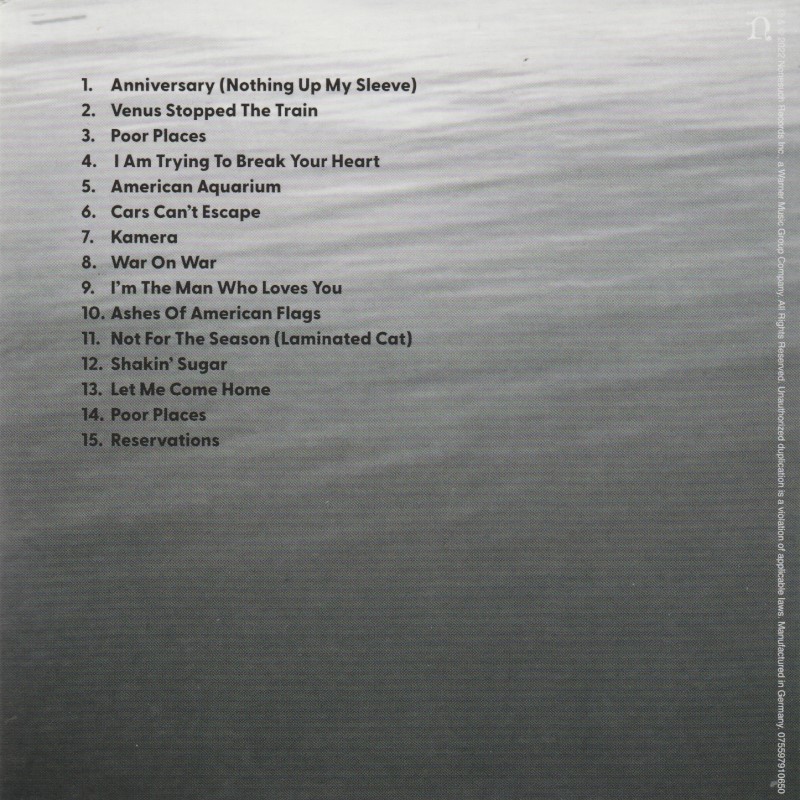
American Aquarium is the quintessential draft. Differing heavily in the details, parts that were there to these songs from the beginning rubbing up against all the bits that would very necessarily be changed for the final album. This is the sound of a band trying to play very subtle songs very straight and live, and for some of them, that works great, and these usually stand as the disc’s highlights. For others, it was clear a different direction would need to be taken.
In some ways, it’s impressive just how recognizable Foxtrot‘s songs were from the beginning. I related a lot to Jeff Tweedy’s insistence in the book that he was writing pop music, not some big avant-garde statement, because really, these songs are not so elusive that they can’t be enjoyed on the merits of being moody pop music. “Reservations” is just a piano ballad, same as “Cars Can’t Escape”. “Ashes of American Flags” isn’t really all that far off from its final, mostly differing in how it starts and ends and, let’s give this its own paragraph, Jeff Tweedy’s vocals.
It becomes pretty clear fairly early on that a lot of these songs still have their scratch vocals attached. Some singers can make scratch vocals work (fun fact: Failure’s “Blank” has the original scratch vocal still on it), but Jeff Tweedy is not one of them. He’s got a very distinctive voice, but on a bad day, it’s itchy, it’s ragged, his throat blown out and off-key. “Let Me Come Home” is probably the perfect example of a song that’s unlistenable because of a bad vocal, but there’s a couple others that take some getting used to (like the acoustic reprise of “Poor Places”, where he sounds like he has a cold).
A lot of the songs need trimming. There’s a “bombastic” version of “Radio Cure” mentioned in the book. We’ve called it “Corduroy Cutoff Girl” in the past because of the first lyric of the song, and it’s the title track here. The instrumental is great. It’s all shakers, hand drums, guitar noodling, very funky, very busy. All four verses are repeated twice, though, which makes for a slightly redundant listen; I’ve been listening to a fanmade trimmed version that splits the verses up, which is probably why I think it runs a bit overly long, but it’s a lot of fun. Both versions of “Poor Places” have extra lyrics at the ends of each line, something that might throw your ear off if you’re used to the pauses on the Foxtrot version, and I think the pauses work better.
“I Am Trying to Break Your Heart” is a really good marker on all three discs for where in development Yankee Hotel Foxtrot was at that point in time. On here, the song is a very live rendition with a scratch vocal, piano-led, as if the band was trying to attack it like a normal song, but it’s not a normal song. The lack of intro causes it to just start out of nowhere and happen, without any real rhyme or reason. “Poor Places” is nearly the same situation, but I think this one sounds a lot more layered and finished–it’s just that all the layers would get tossed for the final album. It’s its own thing, like a barroom singalong version of “Poor Places”. Very cool.
My ear got caught most by the songs that wouldn’t make onto Foxtrot. “Cars Can’t Escape” is gorgeous, gorgeous, gorgeous–“So I tap my glass and nod my chin and wonder who you’ve been in rhythm with” could very well be the line to sum up a thousand Wilco songs. “Laminated Cat” reminds me of really early R.E.M. (funnily enough, “Camera”)–a very skeletal, subtle instrumental, and Jeff Tweedy painting with words and working in moods more than he recalls discrete events. Sharp stuff. Oh yeah–and “Nothing Up My Sleeve”. It’s a serious shame this one never went anywhere other than the bootlegs.
As I said though, a lot of these songs required subtlety that the band just didn’t afford them on these versions. “War on War” is cymbal crashes and mandolins from the word go. While it’s cool to hear another version of “Venus Stopped the Train”, a long-celebrated Foxtrot outtake, this version has almost too full an instrumental, with a full rhythm section and wispy mellotron stabs, and I think it detracts from the starkness that makes the piano-and-vocals version we’ve been hearing all these years so powerful.
It’s worth noting that the book mentions in several parts that Jay Bennett (Wilco’s second songwriter at that point, and an underappreciated voice in the Foxtrot mythos) had a pathologic obsession with maximalism and stacked each track full of overdubs they very much didn’t need. What we’re hearing is Jay Bennett’s obsession as a full disc. It’s a fascinating listen, and some of the cuts legitimately are great–but it’s just as often strange and kinda overdone.
The Next Draft: Here Comes Everybody
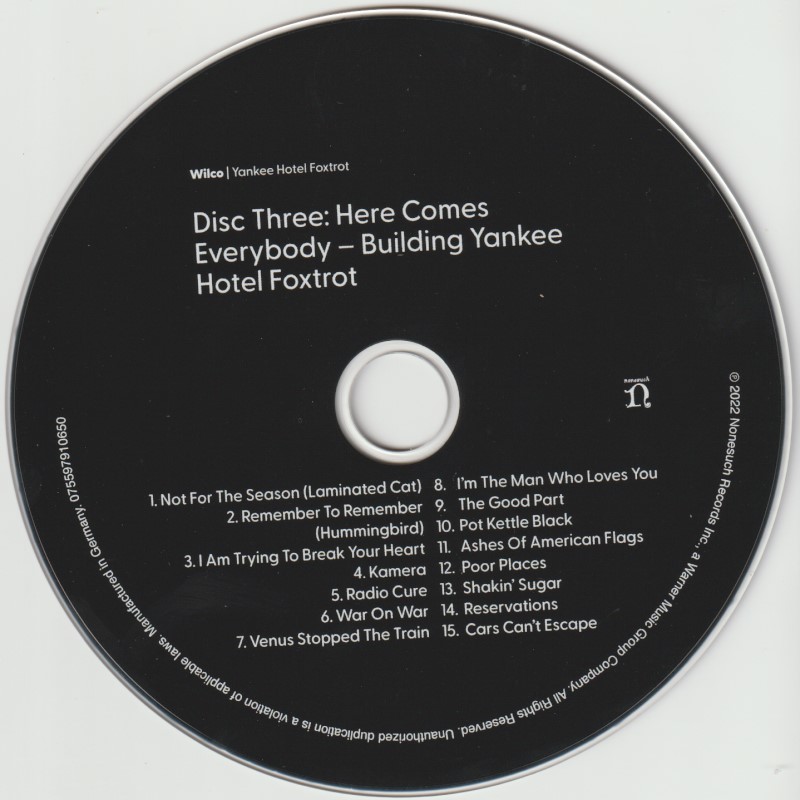
Here Comes Everybody is the middle ground as far as the drafts go. The details are absolutely starting to shape up–a couple songs have their final vocal takes (notably “I Am Trying to Break Your Heart”, even though the instrumental is still wildly unfinished), the running order isn’t far off from final, and some of the backing tracks have definitely taken shape since the last disc, even if they’re still missing a lot of layers and arrangement tweaks.
In what feels like a failure to properly sequence the disc or a desire to keep all the stuff never meant for the album on the edges, the disc starts with a much faster and louder “Laminated Cat” and then a track I didn’t recognize called “Hummingbird”. Turns out it was an early demo for A Ghost is Born! It’s very different from the final, a little more even on the lush, a little less grand at the end, and I don’t quite think I get this track either way, but it’s alright. The feeling of the proper Foxtrot stretch of the album actually starting three tracks in is pretty awkward, in any case; I wish they mixed those in better.
As I said, a lot of tracks are in the right ballpark, but lack the little details that make the Foxtrot versions so satisfying. “War on War” has its structure down, but the little bits of noise that properly begin and end the track aren’t in place, leaving only a clicky drum machine to count us in and out. “Radio Cure” finally has its rumbling, droning acoustic guitar, it just needs its structure and lyrics tightened up. Sometimes, the differences work to these versions’ benefits: “I’m the Man Who Loves You” sounds as big as a full band, but it’s just voice and guitar, and it basically sounds finished. I quite like it.
Other songs are further still from being finished. “Poor Places” had yet to be hollowed out, melding the full band and words of the first American Aquarium version, the mood of the final, and the tone of the acoustic reprise, and it’s really cool to hear and definitely a highlight of the whole package. Less successfully, “Pot Kettle Black” still needed a lot more time in the oven, with its awful scratch vocal, unfinished lyrics, and meandering arrangement. Again, fascinating! A great look into the process, but it just goes to show you it’s all in the details and the focus. This song would suck if Wilco didn’t strip it back, get some verses going, and get Jeff Tweedy to warm up first, but they did, thankfully, and the song became a classic.
Once again, it’s the non-album cuts that attract my attention the most. I was surprised to hear such an, and please don’t think I’m being pretentious here, obvious single in “The Good Part”. The hook is so blatant, the groove so strong, it’s like Wilco wrote a really good radio rock song, sorta in the vein of “Can’t Stand It” from Summerteeth, and it absolutely jarred me on first listen. Normally, Foxtrot is a subtler kind of catchy. The hooks bubble up in your head over time, they’re somber, they don’t smack you in the face like this song does. I didn’t come up with this, but if Yankee Hotel Foxtrot is like sipping a smooth, aged whiskey, “The Good Part” is like shotgunning a Four Loko behind a Taco Bell. I mean that in a good way.
Once again, we return to “I Am Trying to Break Your Heart” as emblematic of the state of Foxtrot at this point. The vocal is final, things are roughly in place, but the band were still having trouble getting it to sound disjointed in the right way. The booklet cites Jim O’Rourke’s cinematic approach to mixing, finding the stage before the blocking and lighting happens. Things just pop out in the right way, at the right time, on the final album. Here, the band are still trying to fake it with live piano stumbles and brisk drums, and there’s no ending to speak of. There was still more time to go in the oven.
The Third Draft: The Unified Theory of Everything
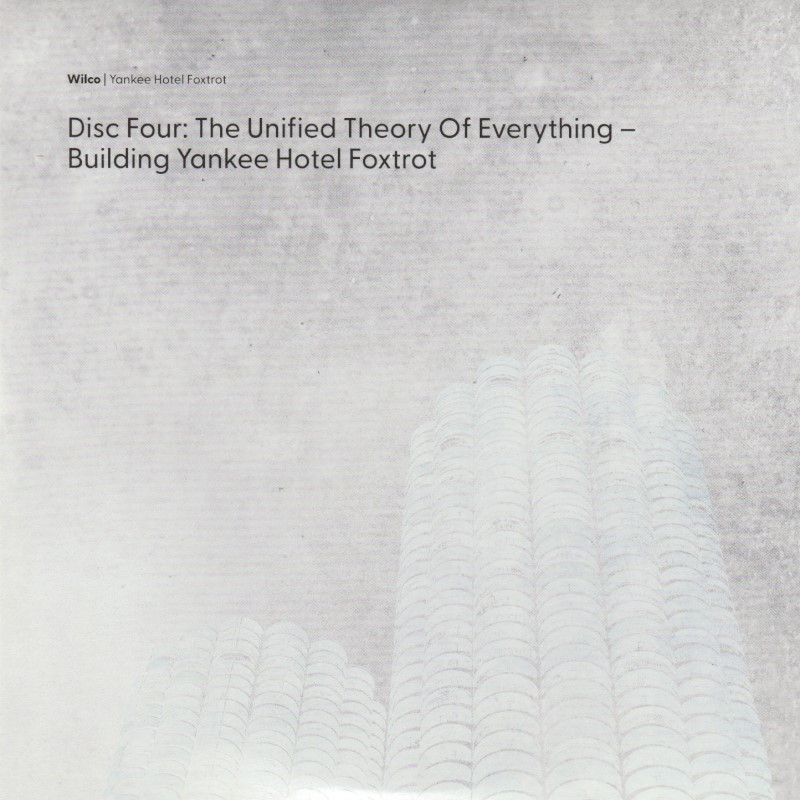
I was really curious what The Unified Theory of Everything would look like as I got into it. With songs shaping up on the second disc, would this one just be rough mixes? How many surprises and alternate versions could be left?
Turns out, quite a few. The Unified Theory of Everything shows Wilco still trying new, crazy, curveball approaches to these songs, this late in recording, and specific details like “I Am Trying to Break Your Heart”‘s opening buzz or the final, defeated “yeah, I’m lost” on “Kamera” showing up at long last is genuinely exciting. (Still no Conet coda on “Poor Places”, though, sadly.)
I still think putting the two non-album cuts at the start of the disc smacks of a certain lack of inspiration, but I like these two a lot more than I liked Here Comes Everybody‘s. The final version of “A Magazine Called Sunset” contrasts the sunny music with the very down lyrics, while here, the more subdued mood and lower key of the song compliment them. The drum part is excellent on it, and “Hummingbird”‘s drum part is similarly really good for a similarly completely different take on the final song. I think I like it better than the one on A Ghost is Born.
On the “still developing” front, “I Am Trying to Break Your Heart” finally has its structure in place, but you can tell there’s mixing troubles. There’s two drum parts that cut in and out, very jarringly. As neat an effect it is, I don’t think it’s quite the one they wanted. “Poor Places” at first still sounds like the earlier versions, right down to the extra lyrics, but when you listen, you hear specific little licks and melodies that would appear in the final song, just with more cinematic ambience and space around them. “War on War” has its final vocal at long last, but it’s still missing the layering that puts the Foxtrot version over the top.
We also have the first appearance of “Jesus, Etc.”, done before the strings were tracked, but after the rhythm section recorded their parts (and this is the rhythm section from the album). It’s really wild to hear it without that really core, central part of the song, the initial flourish of violins, especially in such an otherwise finished context. The lyrics weren’t quite finished yet; Jeff Tweedy plays with phrasing and word choice across each of the three choruses, the “tall buildings shake” line only appearing in the very last one. Makes such a poignant detail of the album’s mythos, the eerie lyrical parallels to 9/11, seem almost like an afterthought. I quite like that.
There’s a lot in the booklet made about the Stravinsky samples that appear during “Ashes of American Flags”. The story goes that Jeff Tweedy tried to sing some of his songs over this very avant-garde classical music, found it worked well, but when he actually tried to bring it into the studio, Stravinsky’s estate wouldn’t clear the samples. They finally got the ability to include it for this boxset. It’s a pretty underwhelming moment if I’m honest–I don’t think the avant-classical adds much to the song, for one thing, but any pleasure you might get out of this version seguing perfectly into “Heavy Metal Drummer”‘s drums and guitar is squashed by this version fading that segue out and the immediately-following “Heavy Metal Drummer” having its own cold open. It’s a highly perplexing and frankly frustrating sequencing choice.
“Kamera” and “I’m the Man Who Loves You” prove to be the standout leftfield moments. It’s long been known that “Kamera” had been tracked occasionally as a balls-out rock song, leading to the “Camera” version on More Like the Moon, but this is a brand new version of that style of the song, and it genuinely does rock. Meanwhile, “I’m the Man Who Loves You” is an upbeat, practically 50’s rock and roll take on the song, Jeff Tweedy’s voice all cracking and caffeinated, the drums and guitars grooving side-by-side, completely separate from both the earlier and later renditions of it. I was stunned, and it was a moment.
Part of the box’s idiosyncracies, not something exclusive to this one, is that the highlights of each would make for a single, amazing early demos disc, rather than three scattershot draft discs. I think if you were going to pick one and only one of these drafts, The Unified Theory of Everything is probably the most satisfying whole. It doesn’t have all my favorites, but I think it sounds the best straight through–that transition from “Ashes” into “Drummer” be damned though.
Scrap Paper: Lonely in the Deep End and the bootlegs
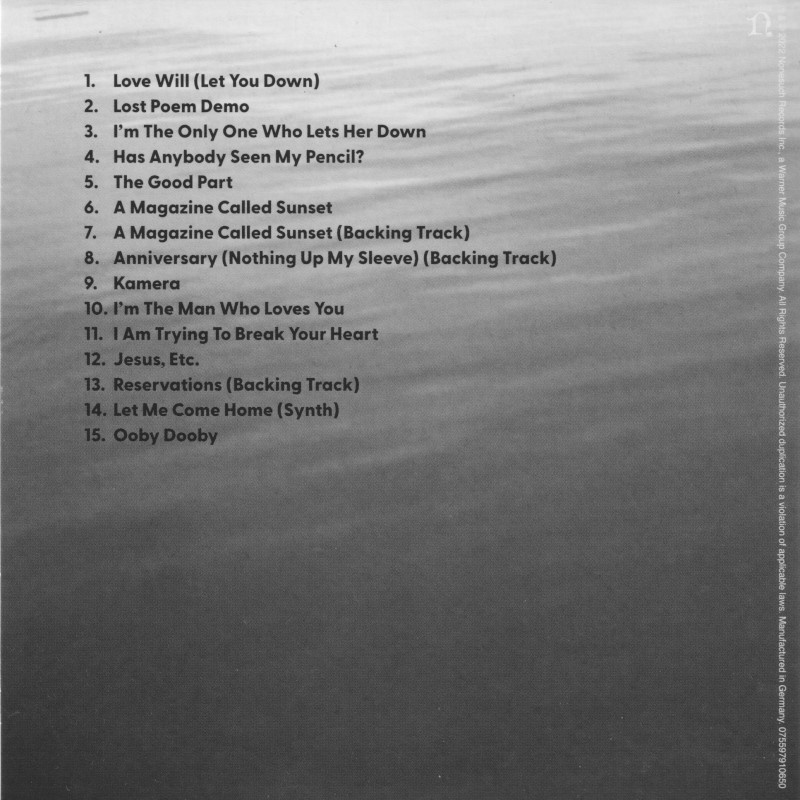
The fourth disc is truly the most scattershot of the lot. Most of the stuff on it is either very, very early song drafts that go on for too long and aren’t recorded in the best quality, are redundant based on what was already included on the draft discs, or are instrumentals that are really cool to hear, but there’s just not enough of them. I really would’ve taken a Yankee Hotel Foxtrot instrumentals disc over what we got here, this was kinda disappointing.
The first half is a tough listen and marks the only time I’ve ever skipped anything in the set. Aside from “Love Will (Let You Down)”, which rocks but needs its runtime seriously halved, it’s five or six tracks of boombox live rehearsals (shocking for studio rats like Wilco) of a few very early song scraps, all of which were abandoned for good reason. They’re just weak–weakly written, weakly performed. Only the occasional lyric from any of these songs made it to the final album–into much better songs. (The subdued acoustic rendition of “The Good Part” reminds me of the acoustic version of Weezer’s “Can’t Stop Partying” though, a hilarious, downbeat contrast to the big, dickswinging full band version.)
Even if the rest of the disc isn’t very exciting though (yet another rock-y “Kamera”, a drumless, acoustic-led “I Am Trying to Break Your Heart”), there are still highlights. As I said, there’s a few “backing track” versions of songs which are full-blown Wilco instrumentals. When you’ve spent so much time listening to Jeff Tweedy’s strange voice, it’s really nice to enjoy just the richly-crafted musical backing behind him–though unfortunately, you only get three of them. There’s also the Roy Orbison cover “Ooby Dooby” right at the tail end, where Wilco do their best rock ‘n’ roll impression and actually manage to sell it. Wilco isn’t a very “fun” sounding band, so it’s really cool to hear them let loose like this–and vocally, it works great too!
Lonely in the Deep End is lacking, but I have to wonder if it’s not exacerbated by its sequencing. Like the draft discs, the Foxtrot songs proper are bunched up here, and the early boombox drafts are bunched up as well. It makes for a very samey listen where your attention is likely to be lost in a mire of stuff you don’t recognize and isn’t good enough to grab your attention either. Maybe put this one on shuffle.
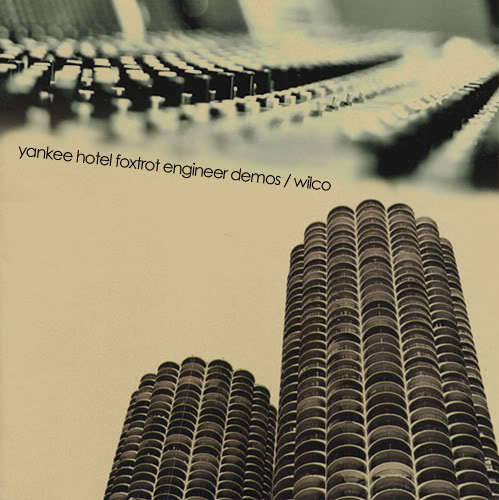
Ah, but what about the bootlegs? They’re an interesting beast. These are pretty classic in Wilco fan lore, and there’s two of them, the Demos (self-explanatory) and the Engineer Demos, rumored to be a reference mix that the band gave to Jim O’Rourke when they asked him to make sense of the sprawling mess the album had become. They each have their own unique renditions of some of the songs to boot (yes, more of them), making for yet two more discs of early Foxtrot for us to piece together.
I actually think a casual listener would do better to check out the bootlegs instead of the boxset. They’re less overwhelming, for one thing, but the bootlegs play like a boxset party sampler, and that means they skip the weird side renditions and weak vocals and just give you neat, early versions of each song. Some still are unique to the bootlegs (especially on the Engineer Demos, like the low vocal “War on War” and the infinitely-better-than-either-of-the-boxset’s-renditions “Pot Kettle Black”), while others overlap with the boxset with differences in mixing and mastering.
Like most bootlegs, there are quality control issues. Some of the songs run much faster than they should, some have audible glitches, some cut out, a bunch of songs on both discs are mislabeled (“Cars Can’t Escape” is “Rhythm”, “Shakin’ Sugar” is “Alone”), and an unfortunate number of them are sourced from lossy encodes. The boxset was actually the first time we got a copy of “American Aquarium” (remember–early “Radio Cure”, also known as “Corduroy Cutoff Girl”) with vocals from a lossless source. By the same token, the boxset is also mastered like modern albums, rather loud (though not unlistenably so, it’s a good-sounding set), while the bootlegs are unmastered and have much better dynamic range.
As such, they coexist. The boxset has better quality control, the bootlegs have better dynamic range, and both have demos of each song that the other doesn’t. If you’re a completionist, you want the best-quality versions of each rendition–you’ll just have to take it track-by-track. (See my Yankee Hotel Foxtrot demo companion page, I’ve done most of the work for you.) If you’re on the fence about if you’d be interested in any of this Foxtrot demo stuff, try the bootlegs first. You get a lot of the important early renditions, just in a much more digestible package.
Comparing the Drafts
Part of my issue with this entire project has been fatigue. I actually went back through the draft disc reviews after listening to the bootlegs and rewrote them to be more positive–because I discovered that I really, genuinely liked the versions of the songs that they shared, I was just fatigued from how much there is to dig through. There really does come a point where you have to ask why you’d listen to a boxset of one album’s outtakes, even if it’s a really good album like Yankee Hotel Foxtrot. Is it because they’re good on their own? Is it to compare and contrast? What do you gain from the extra context of hearing four different versions of “Poor Places”?
Well, sometimes they’re good on their own. Because of Wilco’s time living in the studio, working on this record, even the early versions are studio-quality and occasionally sound like outright finished tracks. As a result, you can pretty easily put together a single, amazing disc of highlights and personal favorites (and I highly recommend you do–I certainly will). “American Aquarium”, Here Comes Everybody‘s “Poor Places”, the rock version of “The Good Part”, the piano ballad version of “Cars Can’t Escape”, Unified Theory‘s “Kamera”, hell, even “Love Will (Let You Down)” if you did your own radio edit of it. It’s all top-shelf stuff, and I’m happy to unearth it from a lot of the merely interesting or what’s in some cases not very good at all.
For compare and contrast–I mean, I got nearly 6,000 words talking about it all! It’s absolutely a 10/10 on the historical front, a dream for the intensely curious and an official acknowledgement of the long-standing allure of the bootlegs. Compare and contrast doesn’t exactly make for pleasure listening, but I don’t think that’s what it’s meant for, not singularly. This boxset is a historical document, a dream for obsessive fans and for people who love the musical process, from rough sketch to finished song. It is fantastic for that.
In a way, it reminds me of late CD-era album rollouts like Beck’s Guero, with the CD version, DVD version, deluxe versions, import versions, and Guerolito all containing different material you’re meant to pick through on your own and curate yourself. These kitchen sink everything-we-ever-recorded rollouts might turn away casual fans, and they can be a pain in the ass for completionists as well, but casual fans aren’t buying this boxset. It’s the people who’d watch an entire movie of Jeff Tweedy and Jay Bennett discussing ten seconds of music who are.
It’s a bit much at times, yes. It’s a lot much at times! Maybe the question is “who needs this much Yankee Hotel Foxtrot?”, and the answer is that I do. You simply do not get this kind of look behind the curtain with most albums. I’d rather have too much material and boil it down to my own favorites than have someone at the label do it for me. I treasure weird releases like this, and this boxset is awesome. (And that’s before we get into the book with it! And the photos! And the live versions! It’s all so nicely done.)
So, now the last question: what do you come out the other end with? What does the context of all these outtakes gain you? Sometimes, when you listen to outtakes, you find that the band should’ve gone with their first thought, that first take where things were fresh and rough and before everything was sanded down. With Yankee Hotel Foxtrot, I think it was the opposite. At any point in recording, the band could’ve called “War on War” or “I Am Trying to Break Your Heart” done and been left with a song that doesn’t quite sound finished. A lot of the early versions here are missing the little details that make the Foxtrot versions so strong–and sometimes, they didn’t even have the big details down!
The real thing you should take from this First Draft is that Yankee Hotel Foxtrot is still fantastic, and the boxset just proves how even a great band like Wilco struggled to tame it. Other revelations: the bootlegs are still a very valuable thing to have on hand. Occasionally, bands have a really good song or three that just doesn’t fit anywhere on their albums, and Wilco were particularly on fire with their B-sides during Foxtrot‘s recording. $3.63 in July 2000 has the same buying power as $6.42 in July 2023.
If you are interested in digging through the boxset on your own, I’d recommend you check out my “Yankee Hotel Foxtrot Demo Companion” page. I’ve catalogued the unique versions from all three discs on the boxset, plus Lonely in the Deep End, the bootlegs, and the B-sides from Alpha Mike Foxtrot. That way, you know which sets overlap with which and you can seriously cut down on the amount of listening you have to do, or you’ll know where to get the best versions of each rendition if you’re making your own mix from it. Happy listening, and thanks for reading this month’s First Draft!
Tags: First Draft, music,

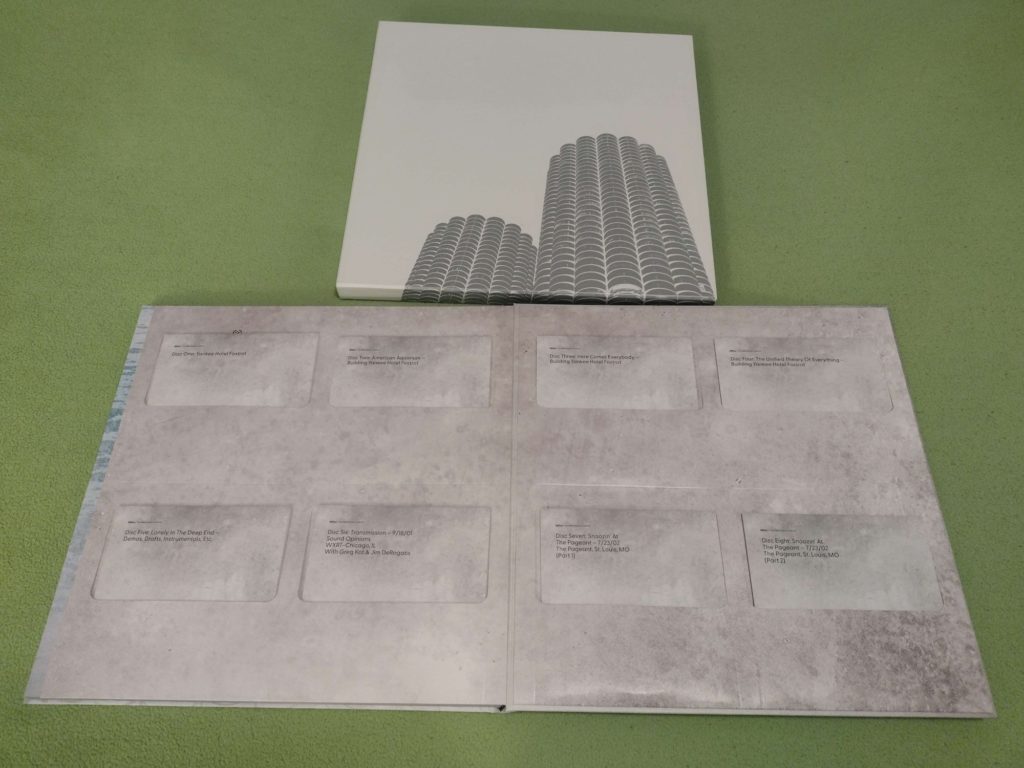
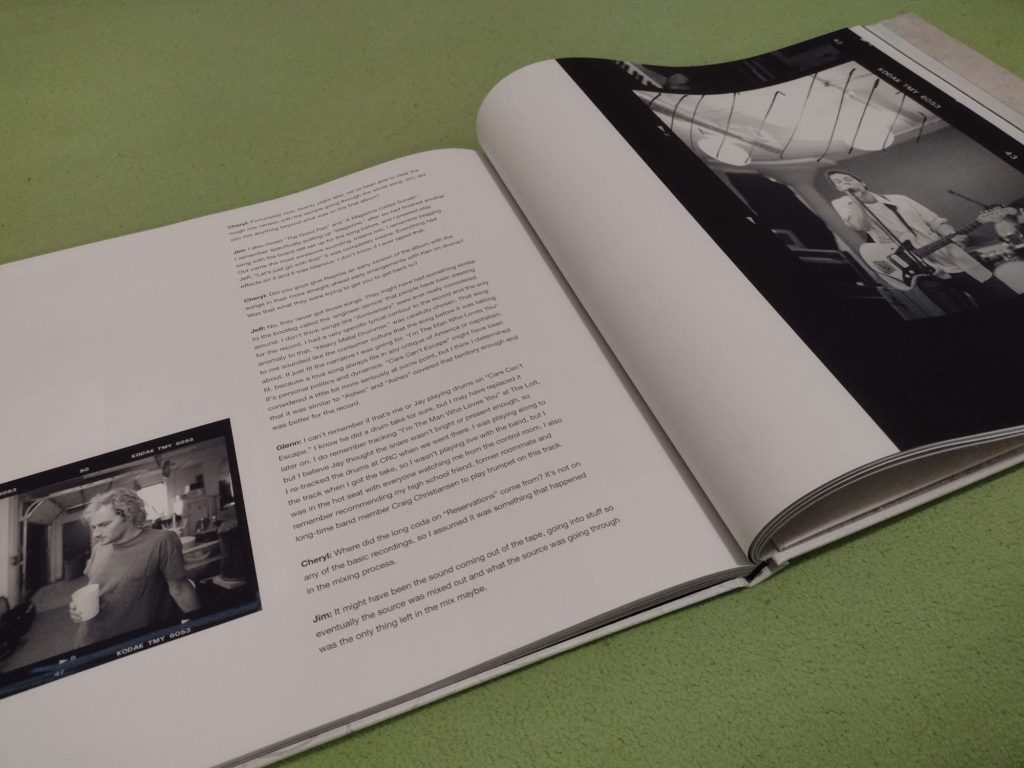
Big, big post! I’ve been snacking on it and a bunch of the songs throughout the day here. You’ve an extreme attention to detail. Worth the wait, man!
Much appreciated, lad, I figured you’d like this one and I like it too >:3c